 So, Donald Trump thinks a reporter “behaved very badly” for asking Trump to justify calling women “fat pigs, dogs, slobs, and disgusting animals.”
So, Donald Trump thinks a reporter “behaved very badly” for asking Trump to justify calling women “fat pigs, dogs, slobs, and disgusting animals.”
Wait. Who behaved very badly? The reporter asking about the hateful, childish name-calling, or the name-caller? The blame-flipping maneuver sounds like it came right out of Alice in Wonderland:
“If I had a world of my own, everything would be nonsense. Nothing would be what it is, because everything would be what it isn’t. And contrary wise, what is, it wouldn’t be. And what it wouldn’t be, it would. You see?”
Like Lewis Carol’s fantasy world, in the world of Trump supporters, everything is upside down. The reporter who inquired about the demeaning name-calling “behaved badly” rather than the name-caller.
Mr. Trump’s response to the question was typically silly. After first cracking up his audience by saying that he only said those ugly things about comedian Rosie O’Donnell – a line you could imagine the school bully using to get a cheap laugh at the expense of the heavy girl in the class – Trump added:
“The big problem this country has is being politically correct. (interrupted by loud cheers) I’ve been challenged by so many people and I don’t frankly have time for political correctness.”
“Oh, you’re just being politically correct.” It’s the lament of many who has been held accountable for their words. Rather than defending the specific idea put forward, the offensive speaker dismissively flips the blame around, saying that the fault lies with the questioner rather than the instigator.
What does “politically correct” even mean? It’s very much in the eye of the beholder. The Merriam Webster dictionary says one who is “politically correct” is:
“Agreeing with the idea that people should be careful to not use language or behave in a way that could offend a particular group of people.”
In other words, we really shouldn’t call fellow humans “disgusting animals” or say we would like to see how pretty our colleagues would look on their knees, because it’s hurtful, demeaning and insulting to them.
How do you know it’s hurtful, demeaning, and insulting? Because you wouldn’t like it if directed at you, or someone you love. The Golden Rule that is cited throughout Christianity and every major religion — Do to others what you would want them to do to you – is there to guide us as we look for how to be “careful not to use language or behave in a way that could offend.”
But the Urban Dictionary definition captures the meaning of political correctness that has been adopted by many modern conservatives.
“The ideology of weird left wing liberals who want society to be nothing but accepting of all perverts and freaks everywhere. The main basis is not to offend anyone with one little incorrect word.”
So, if the speaker believes the subject of the insult to be a “pervert and freak,” then calling that person a “disgusting animal” is justifiable, and the true fault lies with those who don’t understand that the person being insulted is a pervert or freak. Therefore, anyone who questions Mr. Trump’s demeaning of women can be cavalierly dismissed as being under the spell of the conservative supervillain Political Correctness.
Jesus taught his followers that “whatever you wish that others would do to you, do also to them.” What do you suppose he would have said to a disciple who inquired about a loophole: “Um, that doesn’t apply to people I think are perverts, freaks, wrong, fat or unattractive, right?”
The “oh you’re just being politically correct” defense ultimately leads to a no holds barred society where the Golden Rule effectively becomes a dead letter. Is that really what the devout followers of Jesus Christ attending last night’s debate stand for?
Note: This post was re-published in MinnPost.

 The antics of Republican members of the Minnesota State Legislature used to be a
The antics of Republican members of the Minnesota State Legislature used to be a  But to my knowledge, there were no legislators
But to my knowledge, there were no legislators 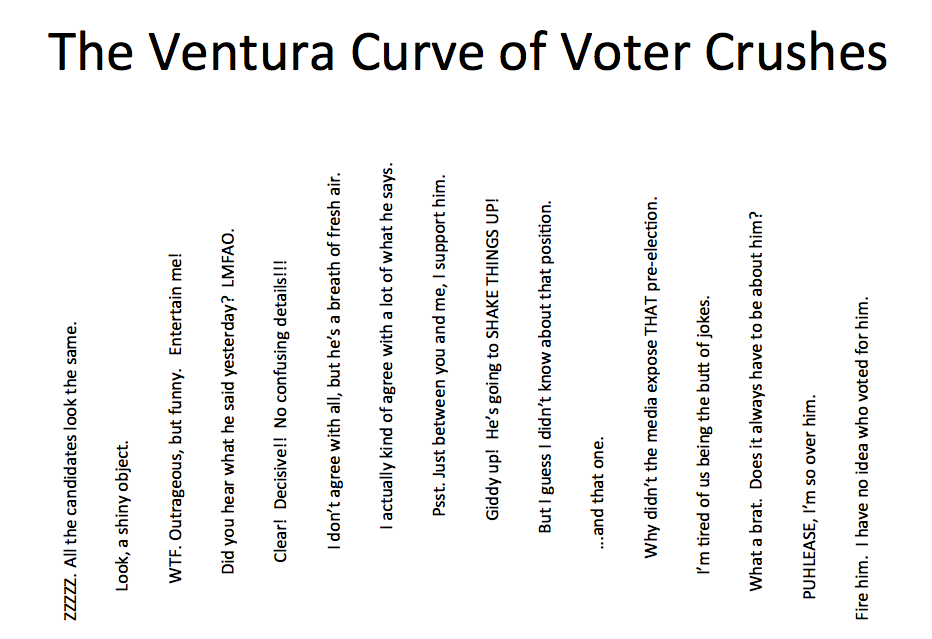
 A lot of liberals I know are privately not all that sure if they are “Ready for Hillary,” as the Clinton boosters put it.
A lot of liberals I know are privately not all that sure if they are “Ready for Hillary,” as the Clinton boosters put it.
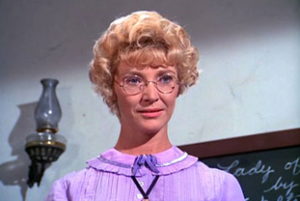 As a case study, consider how the left often treats teachers. Listening to Democrats talk about teachers, you would think that every last one of them is a cross between saintly Miss Beadle from the television series Little House on the Prairie series and life-changing John Keating from the film Dead Poet’s Society. Anyone who has spent time in the public school system understands that the reality is more complicated. Teacher quality ranges the full gamut from excellent to poor, as is the case with every profession on the planet.
As a case study, consider how the left often treats teachers. Listening to Democrats talk about teachers, you would think that every last one of them is a cross between saintly Miss Beadle from the television series Little House on the Prairie series and life-changing John Keating from the film Dead Poet’s Society. Anyone who has spent time in the public school system understands that the reality is more complicated. Teacher quality ranges the full gamut from excellent to poor, as is the case with every profession on the planet.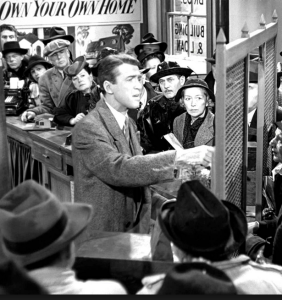 Republicans also have many Untouchables that they fail to regulate responsibly. Listening to the right talk about business people, or ”job creators” as their PR gurus
Republicans also have many Untouchables that they fail to regulate responsibly. Listening to the right talk about business people, or ”job creators” as their PR gurus 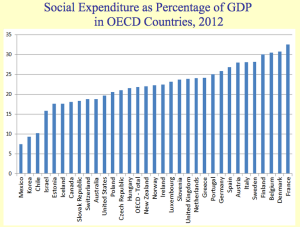 High as a kite from these clippings and the vindication they represent, DFLers run the risk of over-stepping, of pushing Minnesotans further than it they are comfortable going. As much as DFL politicians fantasize about bringing the social welfare
High as a kite from these clippings and the vindication they represent, DFLers run the risk of over-stepping, of pushing Minnesotans further than it they are comfortable going. As much as DFL politicians fantasize about bringing the social welfare 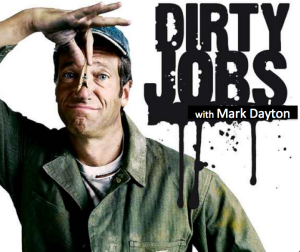 Governor Mark Dayton is Minnesota’s political version of Mike Rowe, the star of the Discovery Channel television show “Dirty Jobs.” Rowe’s show is all about him taking on difficult, disrespected and grotesque jobs that others avoid, such as being a sewer inspector, road kill scavenger, worm dung farmer, shark repellent tester, maggot farmer, and sea lamprey exterminator. Who knew that worm dung needed farming?
Governor Mark Dayton is Minnesota’s political version of Mike Rowe, the star of the Discovery Channel television show “Dirty Jobs.” Rowe’s show is all about him taking on difficult, disrespected and grotesque jobs that others avoid, such as being a sewer inspector, road kill scavenger, worm dung farmer, shark repellent tester, maggot farmer, and sea lamprey exterminator. Who knew that worm dung needed farming?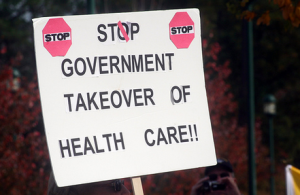 On the heels of the closing of the second year of open enrollment for Obamacare coverage, expect to hear a lot of “government takeover of health care” ranting from conservatives.
On the heels of the closing of the second year of open enrollment for Obamacare coverage, expect to hear a lot of “government takeover of health care” ranting from conservatives.
 One of the things that you can usually expect Republicans to be consistent about is faith in market forces. They’re continually reminding us that we should trust market forces to allocate resources, as opposed to having politicians arbitrarily setting prices and picking winners and losers.
One of the things that you can usually expect Republicans to be consistent about is faith in market forces. They’re continually reminding us that we should trust market forces to allocate resources, as opposed to having politicians arbitrarily setting prices and picking winners and losers. Minnesota has the best quality of life of in the nation, and we must bribe seniors to stop them from escaping it, say two stories from today’s news coverage.
Minnesota has the best quality of life of in the nation, and we must bribe seniors to stop them from escaping it, say two stories from today’s news coverage. Anybody who has followed my lunatic rantings knows that I’m an unabashed wealth redistributin’, Wall Street regulatin’, minority rightsin’, carbon tradin’, Keynesian spendin’, Medicare-for-Allin’, tree-huggin’, consumer protectin’, Pentagon cuttin’, infrastructure rebuildin’, union supportin’, monopoly bustin’, education investin’ liberal.
Anybody who has followed my lunatic rantings knows that I’m an unabashed wealth redistributin’, Wall Street regulatin’, minority rightsin’, carbon tradin’, Keynesian spendin’, Medicare-for-Allin’, tree-huggin’, consumer protectin’, Pentagon cuttin’, infrastructure rebuildin’, union supportin’, monopoly bustin’, education investin’ liberal.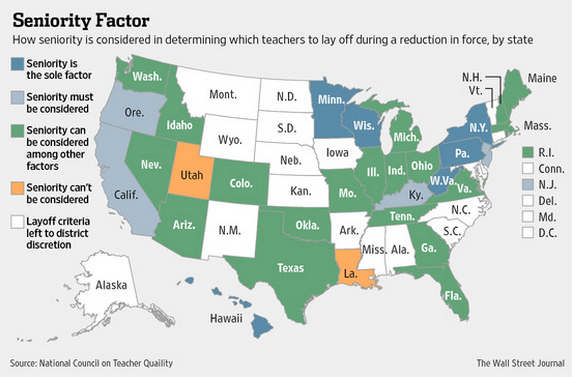 A talented young teacher who is successfully improving kids’ learning automatically should be mandated to be the first to be fired? That’s putting kids first? That’s pro-teacher? That’s pro-education? That’s respecting the teaching profession? That’s helping struggling low-income school districts, who have a disproportionate share of younger teachers? That’s liberal?
A talented young teacher who is successfully improving kids’ learning automatically should be mandated to be the first to be fired? That’s putting kids first? That’s pro-teacher? That’s pro-education? That’s respecting the teaching profession? That’s helping struggling low-income school districts, who have a disproportionate share of younger teachers? That’s liberal?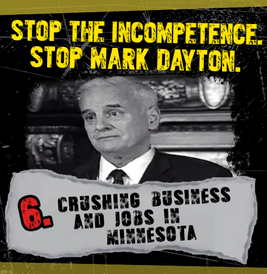

 Minnesota Republicans captured control of the Minnesota House of Representatives in part by fueling urban versus rural resentment: “Those metro-centric DFLers give everything to Minneapolis and St. Paul.” The truth is, turnout trends associated with non-presidential year elections were a
Minnesota Republicans captured control of the Minnesota House of Representatives in part by fueling urban versus rural resentment: “Those metro-centric DFLers give everything to Minneapolis and St. Paul.” The truth is, turnout trends associated with non-presidential year elections were a  Here’s how: About 18% of South Dakotans who currently say they will vote for former Republican U.S. Senator Larry Pressler are making it impossible for second place Democrat Rick Weiland to get enough of the anti-Rounds votes to defeat Rounds. Even though polls consistently show Pressler is running a distant third, some swing voters have been attracted to Pressler, in part because he has promoted himself as the only member of Congress who was cleared during the
Here’s how: About 18% of South Dakotans who currently say they will vote for former Republican U.S. Senator Larry Pressler are making it impossible for second place Democrat Rick Weiland to get enough of the anti-Rounds votes to defeat Rounds. Even though polls consistently show Pressler is running a distant third, some swing voters have been attracted to Pressler, in part because he has promoted himself as the only member of Congress who was cleared during the 
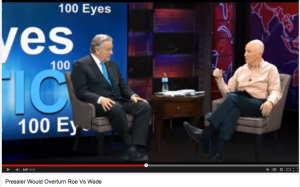
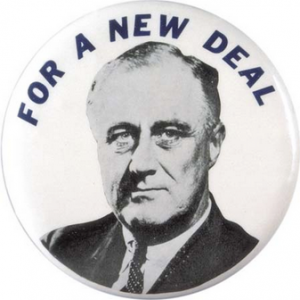 But progressives are also supposed to lead the way forward. The dictionary says a “progressive” is “a person advocating or implementing social reform or new, liberal ideas.”
But progressives are also supposed to lead the way forward. The dictionary says a “progressive” is “a person advocating or implementing social reform or new, liberal ideas.” But there is at least one policymaking unforced error that is making things a bit more difficult for the DFL — the DFLers authorization of a new Senate office building.
But there is at least one policymaking unforced error that is making things a bit more difficult for the DFL — the DFLers authorization of a new Senate office building. Most voters won’t do a comprehensive financial analysis of whether DFL leaders are doing a good job stewarding their tax dollars. They will judge fiscal stewardship based on an isolated example or two. Republicans are working overtime to make sure that the Senate Office Building is the example voters use to make their judgement.
Most voters won’t do a comprehensive financial analysis of whether DFL leaders are doing a good job stewarding their tax dollars. They will judge fiscal stewardship based on an isolated example or two. Republicans are working overtime to make sure that the Senate Office Building is the example voters use to make their judgement.